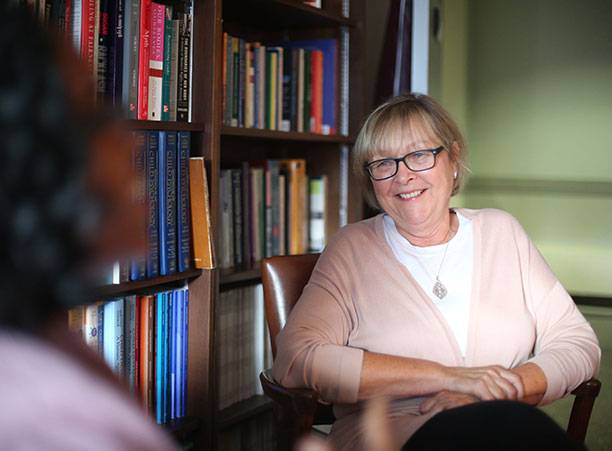psychology, explores in her popular and well-regarded courses.
As a teacher and mentor at the College, Bukatko has played a significant role in the lives of hundreds of students over the course of her 42-year tenure. It was only fitting then that the College awarded her the 2018 Donal J. Burns '49 Career Teaching Medal, given annually to one outstanding faculty member who has devoted their life to teaching at the College.
While Bukatko has been lecturing for decades, her approach and accessibility to students is entirely timeless. Bukatko's students describe her as a professor who "ensures that all students are equipped with the necessary resources to achieve success." One student noted, "She was sure to deeply connect with her students, but it was her ability to push them outside of their academic comfort zones and foster open and dynamic communication that set her classes apart from others."
Binah Saint-Loth '19 — a psychology major with a concentration in Africana studies and one of Bukatko's former students who is currently doing research with the professor about women in leadership — sat down with Bukatko to talk about teaching, making an impact on students and how she still gets jazzed about psychology.
Saint-Loth: What drew you to psychology, especially developmental psychology?
Bukatko: That's really a great question. It was my wanting to understand how human beings think — I wanted to know more about the brain and how it functions, and how we remember, and how we solve problems, and generally how we function in the cognitive domain. I thought adults were very complicated, and I thought it made sense to start that investigation by looking at the youngest, what I thought were least complicated organisms. But as you know, it turns out research shows that even babies are pretty complicated.
Saint-Loth: How were you introduced into developmental psych? Was it through a mentor or a class?
Bukatko: My alma mater is Rutgers University — I went to the women's college, Douglass College. I took a child development course with Melinda Small. There were things that we were reading in that course that really captivated me — about babies, about other species and the possibility that they had language and thought. I was captivated by the possibility that science could help us understand some of the questions I wanted to answer.
Saint-Loth: Had you ever known that you'd be teaching developmental psych in the future?
Bukatko: No, I didn’t know. I did an honors thesis on children's writing, actually — how they learn to write the alphabet. I discovered that I loved that process of asking a question, collecting data and coming to some conclusion about the question. I went to grad school to do more of that, and I didn't realize that teaching would be a big part of what I would end up doing.
Saint-Loth: Knowing what you know now, what kinds of things would you tell yourself both as a graduating college senior and as you first began your career as a professor?
Bukatko: I wish I had taken advantage of opportunities to be better at public speaking. I think that's the avenue to power. Not that I want power, but I think if you're not skilled at public speaking, it can be limiting in terms of opportunities or getting your message out. We actually had a required speech class in college, and I cut it all the time! It was that difficult for me. I think the college had the right idea by offering the course, I just don’t think I took full advantage of it.
The common knowledge when you start teaching is you try to function like a graduate student and talk incessantly about as much as you know. Now, 42 years later, I'm actually reducing content a lot. I really feel the more important thing is skill. You don't have to read everything I've read, you don't have to know everything I know; it's more important to think in certain ways.
 Danuta Bukatko talks with Binah Saint-Loth '19. Photo by Tom Rettig
Danuta Bukatko talks with Binah Saint-Loth '19. Photo by Tom RettigBukatko: I think we could do a better job of preparing students for public speaking. So many of our students go on to be leaders in industry and education and medicine. Some of them go on to be leaders in politics. What concerns me is the lack of participation of women in those leadership roles. As our research is looking at, part of that might be related to lack of confidence or lack of skill in public speaking. This isn't just about women; it's about any student whose tendency is to be quiet, who has a lot going on inside. That person can be a leader, too.
Saint-Loth: Are there any kinds of conversations you've had with your students that have stuck out to you?
Bukatko: I teach a seminar on gender role development and I feel like there is a craving for some of that skill that we've been talking about. Next semester I'm doing a tutorial on women in leadership with two students. You can join in, if you want! One idea is to develop a course either here in the psychology department or in CIS on women in leadership.
Saint-Loth: I’ve been asking all the questions here, but I wonder what’s your favorite question to ask students?
Bukatko: What I like to ask students — and I think you've heard this — is "Isn't this amazing?" When we're talking about what babies do or how the mind works or how language functions, I always ask that. I guess I just hope that students get as jazzed by the material as I do — and I do get jazzed about it.
Saint-Loth: What has been your favorite thing about being a professor?
Bukatko: It's watching the growth. It's watching people go from one place to another — there's nothing better.

